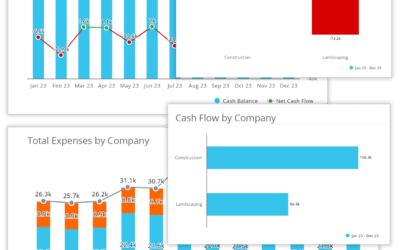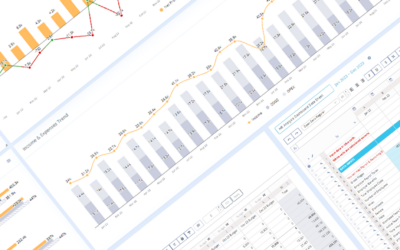How to get an Audit for your Small Business

We have found three of the biggest and most common red flags. Each one, if the numbers are out of place, will land you an appointment with the IRS. Let’s go over each one, learn why and how to avoid them.
Cash is King –
If your small business conducts a large number of cash transactions (think restaurant, bar, laundromat, etc.), you are already at a higher risk for an audit. This increased risk is due to the increased chance of skimming and other fraudulent practices. It is just the way it goes in a cash-heavy business. Be vigilant in honestly recording all cash transactions. Don’t assume you will “remember” to do it tomorrow, next week, or before month-end. We all know how that will end up. As a follow-up, having the paperwork to back up your filings is crucial and can save you if an audit comes along.
Where you need to focus is on any transactions (cash or trade) over $10,000. This type of sale may be the biggest red-flag of them all. Any time this size of a deal comes along, you need to use a form 8300 (also excitingly called Report of Cash Payments Over $10,000 Received in a Trade or Business). No questions, just fill it out. The filing of a Form 8300 helps the IRS combat money laundering and other fraudulent and illegal activity. Not filing a form 8300 can result in fines and possibly civil or criminal charges. Seriously, file it.
Working within a budget and making sure your accounts receivable and payable are in check are also efficient ways to keep the IRS for wanting to take a more in-depth look at your cash finances. Anytime cash is used documenting because even more important because there is no paper trail, no credit card statement to go back and look at, no bank statement, nothing. The IRS will not look kindly on a business with lots of cash transactions and not a lot of documentation.
All play and no work –
Part of running and owning a small business is networking and entertaining current clients and possible future clients. Those costs are most definitely tax-deductible, but be careful. Be mindful that too much “play” can alert the IRS, which in turn can lead to an audit. No deducting your hobbies or habits as “business expenses.”
The IRS will take and compare deductions between the average deductions for someone in the same income range as you. If you are above average, a red flag will be triggered. By all means, deduct the items you are entitled too! Just make sure you have the evidence to back them up. There are many ways these days to use technology to track expenses, that smartphone of yours can be your best friend when it comes to keeping receipts. Simply take pictures of applicable receipts or use an app to store them for you. Either way, there is no excuse for losing receipts.
If your travel is work-related (and you can prove it if it becomes necessary), all travel expenses can are deductible. Deductions would include but not limited too; airfare, rental car, hotel costs, and gas. As far as meals go while you are traveling, 50% can be deducted. Check with your tax professional and accountant for more specifics.
As a rule of thumb, claim 50% or less of entertainment & food expenses as a business deduction. Keep it realistic and as always, save receipts and document, document, and document again.
Payroll –
Chances are you have employees. I mean, you are running a business. That means you get to pay payroll taxes. You also get to pay them on time. YEA! The IRS will notice if you have only “independent contractors” as your workaround for filing payroll taxes. This tactic could cost you dearly in fines.
The most efficient way to make sure your payroll is accurate and honest is to outsource your business payroll. Since your expertise is in other areas, hiring it out is a great way to get it done right and save your stress and headaches. The benefits of a Payroll/HR far outweigh the costs and do so much more than just cut checks for your employees.
- Time-saving so you can focus on your business. Your time as a dollar value associated with it, spend your time where it is most valuable—not doing payroll.
- Additional Data Security. There is a higher risk that comes with in-house payroll. Lots of eyes, seeing sensitive financial information, opens the door to temptation. Also, payroll companies use servers with the highest level of security, much higher than what you most likely have in your office.
- Team of experts who are trained in Payroll rules and regulations. As with anything that includes the use of government documents, payroll can be confusing and is continually changing. Keeping up with the laws can be overwhelming and can lead to an audit if done incorrectly, regardless if intentional or not. Guaranteed government compliance is priceless.
- Employee access to their data through an information system. Most Payroll/HR companies offer as part of the cost employees access to an information system. An information system means no more employee requests to see their W-2, 1099’s, days off, deductions, blah, blah, blah. How great does that sound?
These are not the only red flags that may alert the IRS to your small business, but they are the most prevalent and also the easiest to avoid There are two easy and cost-effective ways to prevent an IRS audit. First, hiring a tax professional or an accountant certified in filing tax returns is your best bet to avoid an audit. The tax laws are continually changing and can be challenging to keep up to date on. Not only will your tax return be correct, but it will also leave you time to run your business. Second, use Reach Reporting all year long to keep track of your finances, see where you stand before tax season comes around. Reach reporting absorbs the complexity of financial information and turn it into visually enhanced financial reports. Reports that are easy to understand making the data actionable and right at your fingertips.
No one wants an audit, that is without question. If your number is called and the tax man comes knocking, being prepared with paperwork, documentation, and reach reporting on your side, you will handle it perfectly.




0 Comments